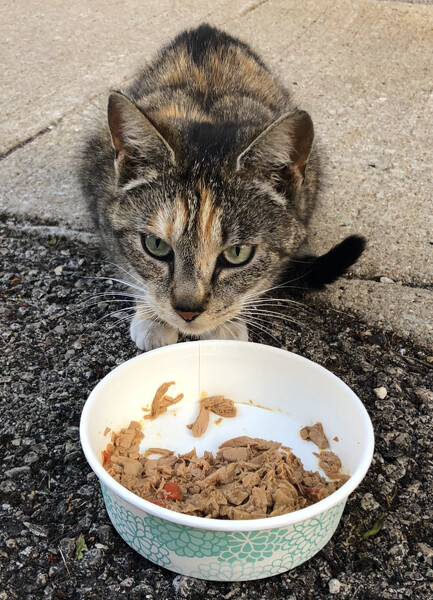
Celina Cares, a nonprofit nearing the 4,000-member mark, volunteers to trap, spay/neuter and return cats to their point of capture to curb rising feral cat numbers in Mercer County.
CELINA - A Celina-based coalition of volunteers dedicated to stemming feral cat populations in Mercer County primarily through a process known as trap, spay/neuter and return (TNR) is seeking the moral and financial support of Celina City Council.
A large crowd packed council chambers at this week's council meeting, with many of the attendees wearing Celina Cares shirts in a show of solidarity for the nonprofit founded by residents Sara Kriegel and Jackie Crouch in late 2019.
Without groups like Celina Cares, the city could be overrun with stray cats, asserted Dr. Scott Siegel, a semiretired licensed veterinarian and TNR advocate from Celina.
One unspayed female cat and her offspring, he pointed out, can produce up to 400,000 cats.
"When Sara says that they would like the support of the town, it's really serious, because if that (group) … folds because they've run out of money or energy, we're going to have a mess here," Siegel said.
"We knew that there was a local cat problem, and it didn't seem like anyone would step up to do anything," Kriegel said. "Stray cats can get out of control very quickly, so we decided to form a group that would come together to work on this growing issue. Today we have over 3,900 members, and with me tonight are some of our volunteers, trappers and foster moms."
They collect feral cats, mostly by trapping, and facilitate spaying/neutering before returning the creatures to where they were captured.
Celina Cares has fixed over 2,000 cats and fostered and adopted out over 600 cats since forming in 2019, spending a minimum of $40,000 annually, Kriegel said.
"Everyone in our group is a volunteer, and every dime we raise goes to the group for fostering, supplies, spay and neuter, vet care, etc.," she explained. "We do not get funding from anything other than our own fundraising efforts, which is supported by our members and even some local small businesses."
The lowest cost locally for spay and neuter services is $150, "exactly why our city has an overpopulation problem," she said.
However, the group has reached an agreement with Humane Ohio in Toledo, even though Celina is outside its service area.
"I explained that our county is one of the few counties without a humane society and no program that helps community cats," Kriegel shared. "They've granted us a special privilege of servicing our area, and we have been doing monthly spay and neuter clinics ever since."
Celina Cares pays Humane Ohio $200 a month for its services.
"They come to my house once a month, transport 36 cats back to their clinic, fix them and bring them back to my house the same evening," Kriegel said. "The cost to fix an outside community cat is only $35, and they also receive a rabies shot. This is a savings of a minimum of $115 per cat (compared to) if we were to fix them locally."
Additionally, a quarter-inch is taken off the tip of the left ear of each cat to indicate it has been fixed.
"This helps us to identify the cats that have already been fixed," she noted. "Our group also fosters neonatal kittens and adopts them out if we have a foster mom willing to take the kitten. We will only take in sick kittens or abandoned kittens that would otherwise not survive without our intervention, because our foster moms do all of this in their own homes."
Kriegel emphasized that Celina Cares is a TNR group.
"This means that any cat we fix is returned to the location where it was trapped," Kriegel said. "Whether you love cats or hate them, the goal is the same - fewer stray cats. If you love cats, you want less strays suffering on the streets, and you want those out there to be healthy."
Simply removing cats won't solve the problem, she insisted.
"It just creates the vacuum effect, meaning new cats move in and start the cycle all over again," she said. "But when you TNR, the colony stabilizes: no more kittens, less odor, less noise, decreased fighting and overall fewer cats."
Prohibiting residents from feeding cats isn't a solution either, Kriegel said, adding that many Celina Cares members throughout the community are cat feeders, providing food and shelter for "outside community cats."
"This is essential to our efforts," she said. "I'm sure you've all seen some communities lately banning the feeding of community cats."
Such misguided policies, she argued, create new problems.
"If you take away the food, shelter and water to cats our community feeders provide, the cats are going to seek shelter in unwanted areas and also seek food from alternative sources, such as garbage dumpsters, etc. When a community member is on board with our efforts, we provide them with shelter, donations of cat food when we are able, and spay and neuter resources."
In fact, TNR is the only answer to the cat dilemma, Kriegel maintains.
"We do not relocate cats. If you trap and dump or relocate a cat, this is cruel … because it deprives them of the things essential to their life - food, water and shelter, which is a crime because animal cruelty laws in Ohio also apply to stray cats and makes it a felony as ruled by the Ohio Supreme Court."
On average, a female cat can have two to three litters of kittens per year, with an average litter size of four kittens, according to Kriegel.
"The average life span of an outside cat is four years, so if we fix the cats to prevent litters, over time numbers naturally decrease," she said."Cats are territorial, so fixing the cats and returning them to the same location keeps down the number of cats showing up, because they will run off new cats."
Celina Cares, Kriegel said, would love to have the support, both financial and moral.
"Since our county does not offer a humane society or any other organization to help with animal issues, we have stepped up to help with the cats as best we can," she said. "We ask for your support in this matter and want you to be informed of what we are doing and why this is the only solution to a stray cat problem in any community."
She ceded the podium to Siegel, the traveling veterinarian, who noted the very few people involved in this are making a huge difference. He spoke of an unspecified small town in West Virginia that had a sole veterinarian and no TNR program in place.
"The solution that that community chose was poison that they would put out, because they didn't know what else to do. There were cats all over it," he said. "We did as much as we could, but the area got overrun. It was terrible. They would do collections of cats and put them down in horrendous ways."
Mayor Jeff Hazel applauded Kriegel and Celina Cares for their volunteer work.
"I think it's incredibly important what you do, and I appreciate everybody coming tonight," Hazel said. "I think it does show council that this is very important for people to understand this."
Some councilors, too, praised Celina Cares, with council president Jason King calling the presentation revelatory.
However, councilors stopped short of committing financial support to Celina Cares. They did direct city administrators to look into including information about the group and their volunteer work in the city newsletter and on the website.
The problem of exploding cat populations isn't limited to Celina.
Kriegel told The Daily Standard a few years ago that stray/feral cats in Mercer County congregate in various areas where they can find shelter and a steady source of food, sometimes supplied by caring humans. Examples include local mobile home courts, the Mercer County Fairgrounds and certain residences.





